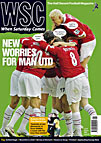 Few countries were as desperate for a lift from the World Cup as Trinidad & Tobago, whose team provided some much needed national unity, as Mike Woitalla explains
Few countries were as desperate for a lift from the World Cup as Trinidad & Tobago, whose team provided some much needed national unity, as Mike Woitalla explains
XTrinidad & Tobago defender Marvin Andrews was 12 years old the last time his country came close to qualifying for a first World Cup. The Caribbean twin-island nation needed to draw against the United States in Port of Spain on November 19, 1989. Dwight Yorke, who had turned 18 two weeks earlier, started in midfield. Schools lifted their dress codes so the children could honour “Red Day”. The 30,000-strong crowd at Hasely Crawford Stadium looked like a scarlet blanket. Calypso bands played tunes about going to Italy. The Mighty Sparrow sang: “I never know Trini did love football so.” Lincoln Phillips, a former T&T national team goalkeeper, said: “It’s crazy. It’s the first time in the history of the country that everybody has gotten behind one thing.”
But Paul Caligiuri’s looping long-range shot out of the sun flew past keeper Michael Maurice and a 1‑0 USA win ended the Trinidadian dreams. “After that everything went downhill – the football, everything,” said Andrews, now at Rangers, days before a play-off in Bahrain for a spot at Germany 2006. “To take the country to a World Cup would change a lot of things in the country. The crime rate is really high: we are talking drugs, killing, murdering, kidnapping – the lot. That’s how bad it is getting. So we will try to help by taking the country to the World Cup.”
In Trinidad, a nation of 1.3 million, the murder rate this year has reached one per day. Edwards’ faith in the game’s reach recalled the sentiments of Argentina players who felt obliged to win the 2002 World Cup because of their nation’s economic collapse. “We want to give them something to smile about, something they desperately need to do at the moment,” Juan Verón said. That extra pressure did no good at all.
The population is roughly split between descendants of Indian indentured labourers – such as 2001 Nobel Prize for Literature winner VS Naipaul – and descendants of African slaves. The crime problem has exacerbated racial tensions. Trinidad Express columnist George John, not of the it’s-only-a-game view, described the World Cup as a “goal for national unity”, offering that the team could provide a lesson for politicians and for the “sharks in business and industry”.
In the first leg, the Soca Warriors – Soca is music, a fusion of Calypso and Indian rhythms – played nervously, much as they had 16 years ago. But they managed a 1-1 draw, thanks to a long-range rocket from Port Vale winger Chris Birchall, Trinidad’s first white player in 60 years. Birchall, eligible because his mother was born in Port of Spain, has spent his entire life in England. But unlike the Jamaica team that reached the 1998 World Cup, T&T don’t depend on scouring Britain for descendants of expatriates. Most players are born and raised in T&T, even if many, like leading scorer Stern John (12 goals in qualifying), later move to American colleges. John played for a junior college in New Jersey and then for the New Orleans Riverboat Gamblers before entering Major League Soccer and earning a then league record move to Nottingham Forest, in a deal worth around £1.5 million.
Yorke, 34, and Russell Latapy, 37, ended their four-year exile from the national team for the 2006 qualifying campaign, which looked bleak after opening the final round with one point from three games. In came Dutch coach Leo Beenhakker – his salary paid for personally by Jack Warner, the Trinidadian Concacaf president and FIFA executive. Beenhakker steered the Soca Warriors to a fourth-place finish behind the USA, Mexico and Costa Rica. Good enough for the play-off with Asia’s fifth-place team, the Persian Gulf kingdom whose population is half of T&T’s.
The second leg marked T&T’s 20th game of qualifying – twice as many as required by England. And in Bahrain, 8,000 miles from home, the Trinidadians seemed much more relaxed. They got the goal they needed for a 1-0 win with a header by Dennis Lawrence, the towering Wrexham defender, from a Yorke corner. T&T will be the smallest nation at Germany 2006.
“The header worked like a gesture to inaugurate a state-religion season of Advent, heralding arrival or hope of deliverance from evil. Amen, said a million T&T voices,” wrote the Trinidad Guardian’s Lennox Grant. Prime Minister Patrick Manning declared a national holiday. Days later, Manning’s PNM party, whose supporters are mainly Afro-Trinidadians, finally agreed to a bipartisan crime-prevention plan with the opposition UNC, which is supported mainly by Indo-Trinidadians. “It was like a Dennis Lawrence header coming from the top, reaching the ground and leaving the observers mesmerised, quick and effective,” said Independent senator Ramesh Deosaran of the agreement, while the editorial pages linked it to Soca Warrior-inspired unity. For now, at least, it does seem like more than just a game.
From WSC 227 January 2006. What was happening this month